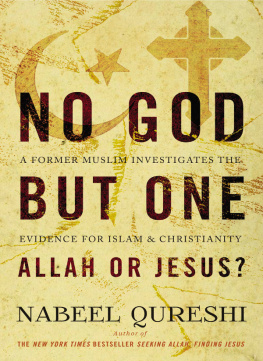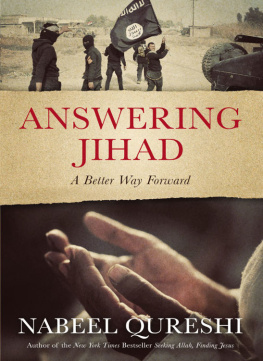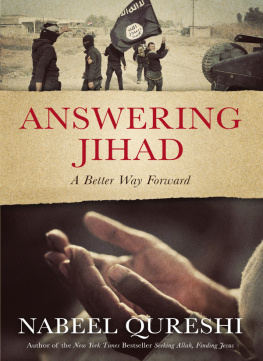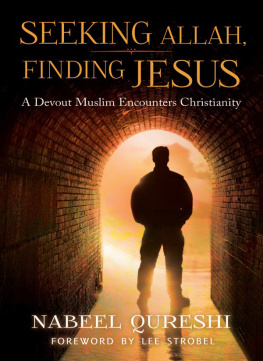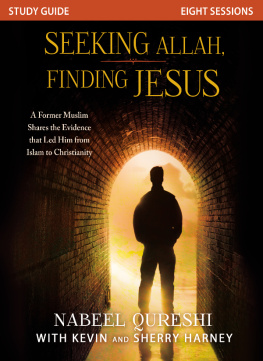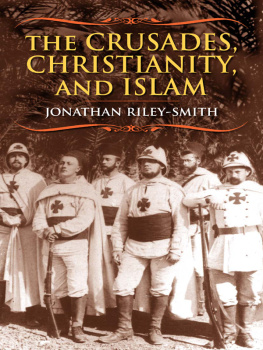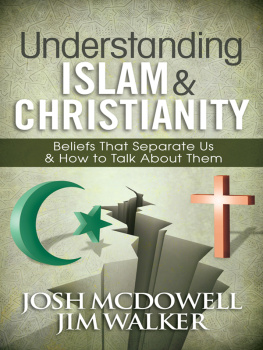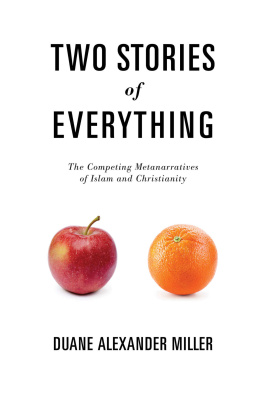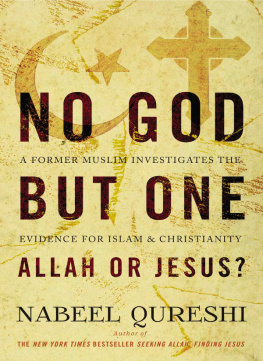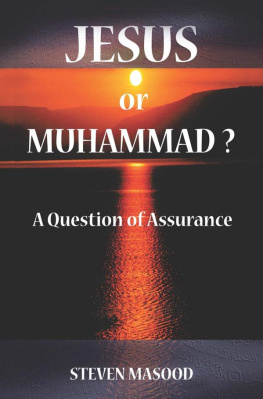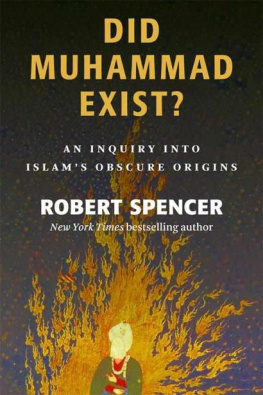ZONDERVAN
No God but One: Allah or Jesus?
Copyright 2016 by Nabeel A. Qureshi
Requests for information should be addressed to:
Zondervan, 3900 Sparks Dr. SE, Grand Rapids, Michigan 49546
Library of Congress Cataloging-in-Publication Data
Names: Qureshi, Nabeel, author.
Title: No God but one : Allah or Jesus? / Nabeel Quereshi.
Description: Grand Rapids : Zondervan, 2016. | Includes bibliographical references.
Identifiers: LCCN 2016019945 | ISBN 9780310522553 (softcover)
Subjects: LCSH: IslamRelationsChristianity. | Christianity and other religionsIslam. | IslamDoctrines. | ChristianityDoctrines.
Classification: LCC BP172 .Q7185 2016 | DDC 261.2/7dc23 LC record available at https://lccn.loc.gov/2016019945
Unless otherwise marked, Scripture quotations are the authors translation.
Scripture quotations marked NIV are taken from The Holy Bible, New International Version, NIV. Copyright 1973, 1978, 1984, 2011 by Biblica, Inc. Used by permission of Zondervan. All rights reserved worldwide. www.zondervan.com. The NIV and New International Version are trademarks registered in the United States Patent and Trademark Office by Biblica, Inc.
Scripture quotations marked NRSV are from New Revised Standard Version Bible. Copyright 1989 National Council of the Churches of Christ in the United States of America. Used by permission. All rights reserved.
Scriptures marked KJV are from the King James Version. Public domain.
Any Internet addresses (websites, blogs, etc.) and telephone numbers in this book are offered as a resource. They are not intended in any way to be or imply an endorsement by Zondervan, nor does Zondervan vouch for the content of these sites and numbers for the life of this book.
All rights reserved under International and Pan-American Copyright Conventions. By payment of the required fees, you have been granted the non-exclusive, non-transferable right to access and read the text of this e-book on-screen. No part of this text may be reproduced, transmitted, down-loaded, decompiled, reverse engineered, or stored in or introduced into any information storage and retrieval system, in any form or by any means, whether electronic or mechanical, now known or hereinafter invented, without the express written permission of Zondervan e-books.
ePub Edition July 2016: ISBN 978-0-3105-2256-0
Published in association with the literary agency of Mark Sweeney & Associates, Bonita Springs, Florida 34135.
Cover design: Brian Bobel
Interior design: Kait Lamphere
16 17 18 19 20 21 22 23 24 25 26 /DHV/ 15 14 13 12 11 10 9 8 7 6 5 4 3 2 1
This book is dedicated to David Wood, a great friend and total doofus.
CONTENTS
Preface
G reat heart and countless hours of effort have been invested into this book. I am deeply indebted to the Zondervan team for their encouragement in spite of the many bumps and turns along the way. I would particularly like to thank Madison Trammel for his ever-present support, Jesse Hillman for strategic perspectives, Brian Phipps for his longsuffering patience, and Stan Gundry for his vision in making this book a reality. Thanks is also due to Mark Sweeney for his insight, wisdom, and loyal friendship.
I would also like to thank the many people who had a hand in making this book better: Richard Zetter, Richard Shumack, Matthew Thomas, John Njoroge, Shawn Hart, and Betsy Duncan. I must thank my darling bride, Michelle, for her loving encouragement despite the many days I had to spend away from her to write. I would also like to thank my beautiful daughter, Ayah, for being born in the middle of this project, filling my life with color and joy.
Last, and certainly not least, I would like to thank the Lord God for giving me the impetus and means to pour myself into this effort. I pray it would all be for his glory and his people. Amen.
D ear Reader,
I truly thank you for taking the time to read this book. For me, and for millions of others like me, the subject matter of these pages is far more than information. It is the full engagement of heart and mind in search for the true God and true Life. What I share is a summary of fifteen years of research that wrenched my heart and transformed my life.
You might have already read the account of my journey from Islam to Christianity, Seeking Allah, Finding Jesus. That book is the heart of my story, detailing the relationships, emotions, and spiritual struggles in my search for God. No God but One: Allah or Jesus? is the mind of my story, examining the religions and their claims. In the course of this book, I hope to elucidate two overarching matters in particular: that the differences between Islam and Christianity have great implications, and that the evidence of history strongly supports the Christian claims.
GOD, ALLAH, AND YAHWEH
Before beginning, the title of this book could use some explanation. Both Islam and Christianity are monotheistic, believing there is no God but one, but they differ fundamentally on who that God is: Allah or Jesus.
There are at least four common uses of the Arabic word Allah. First and foremost, it is used to refer to the Muslim concept of God as described by Islam. This should not surprise anyone. The second use is to simply mean God in a generic sense; so, as with the English word God, Allah need not imply any specific religion. But the last two uses may be surprising: Many Arabic-speaking Christians do use Allah to mean the triune Christian God, and sometimes Christians use the term just to refer to the first person of the Trinity, the Father.
To further complicate matters, Christians often do not clearly distinguish between persons of the triune God. Thus they can confuse their Muslim friends by saying something like, Jesus is God, and in the next breath, Jesus is the Son of God. Although both statements are technically accurate doctrine, they will only cause confusion by switching between uses of the word God. Their Muslim friends might respond to this by saying, So is Jesus his own son? And they would be right to ask for clarification.
In this book, I will attempt to pay close attention to the way I use these words. The term Allah will refer specifically to the Muslim conception of God, the term Yahweh will be used when I intend to refer specifically to all three persons of the Trinity, and the term God will be used when the occasion calls for a generic use or intentional ambiguity. The terms Father, Son, and Spirit will be used to refer to the specific persons of the Trinity. Finally, if this paragraph is difficult to understand, I am really glad you are reading this book. Please spend extra time in part 2.
THE CHALLENGE OF SEMANTICS
One of the greatest troubles in religious discussions is how we define our words. When some people say Islam, they essentially mean the religion that a Muslim friend practices. But what a friend does can look very different from what an imam in Saudi Arabia does, so how do we decide which of them more accurately represents Islam? There are many branches and sects that purport to follow Islam, so how can we know whether they are actually Muslim? Do we just assume that everyone who identifies as a Muslim is representing Islam? If so, how do we handle the assertion that terrorist groups like ISIS do not represent Islam when they clearly claim to be Muslim?
This problem is more difficult than it appears, but to prevent our terminology from becoming a moving target, we have to at least circumscribe a definition. I think a religious group ought to be defined through a historical lens. What was it that gave the group its own identity and set it apart from other groups at its inception, according to its traditional narratives? In the case of Muslims, their defining act was assenting that Muhammad is a prophet and exclusively following his teachings as revelations from Allah. In this book, we will consider all who do the same to be Muslims. We will consider Islam to be the teachings of Muhammad in that early period of identity formation.

